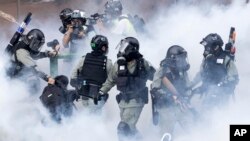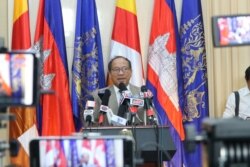Cambodia this week reiterated its support for China’s attempts to quell violent protests in Hong Kong, citing its adherence to the “One China” policy.
Protesters and police have clashed for months in the semi-autonomous region, initially sparked by opposition to legislation that would have allowed the extradition of Hong Kong residents to mainland China. More recently, protests have adopted a more strident pro-democracy tone, rejecting communist China’s influence over the economic hub.
Speaking with VOA Khmer, Cambodian government spokesperson Phay Siphan said Cambodia sides with Beijing in its efforts to end the strife.
“The Royal Government of Cambodia has stated many times that it is important we respect the One China policy,” he said, adding that the kingdom views unrest in Hong Kong as an internal Chinese matter.
Cambodia’s stance has drawn increasing scrutiny as protests intensify in Hong Kong, highlighted by a recent standoff between student protesters and security officials at the Hong Kong Baptist University, which saw the campus shrouded in tear gas and smoke from Molotov cocktails.
Phay Siphan signaled that nothing has changed from Cambodia’s point of view.
“We classify Hong Kong as the territory of China and that there should not or must not be interference from others for any reason at all,” he said.
Similar statements of support
On the issue of noninterference, China made similar comments in support of Cambodia during Phnom Penh’s crackdown on the country’s political opposition, NGOs and media organizations starting in 2017.
In August, Cambodia first issued a statement supporting China’s effort to quell protests in Hong Kong. In response, China’s embassy in Phnom Penh released a Khmer-language statement thanking Cambodia for its support on a sensitive and divisive issue.
Where does US stand?
Earlier this week, the U.S. Congress passed the Hong Kong Human Rights and Democracy Act that requires an annual review of Hong Kong’s trade status and sanctions for officials involved in human rights abuses. Another bill would prohibit the sale of nonlethal munitions to Hong Kong.
White House officials initially indicated President Donald Trump would sign the bills into law. Friday, however, Trump gave mixed signals on what he intends to do.
“We have to stand with Hong Kong, but I’m also standing with [Chinese] President Xi [Jinping],” Trump said on Fox News.
The bills have elicited strong reactions from Chinese state media, with the Chinese Communist Party-controlled Global Times labeling it the “Support Hong Kong Violence Act.” The Chinese government and state media have accused the U.S. of inciting unrest in Hong Kong.
How much sway does US have?
In Cambodia, Phay Siphan weighed in on the U.S. legislation, saying the bills would have little sway over Beijing.
“I see the world order today and the United States does not have influence on the issue of Chinese sovereignty at all,” he said.
Chheang Vannarith, an analyst with the Asia Vision Institute in Cambodia, echoed Beijing’s position.
“The interference of the United States has been the cause of prolonging the situation and making it increasingly complicated,” he said. “Without foreign interference, the situation might have been in control.”
By contrast, Cambodia-based political analyst Lao Monghay said the U.S. has consistently sided with democratic movements across the world.
American advocacy, he said, “is a weapon to resist control by the Chinese system, be it in Hong Kong, other countries, and the world.”
Hul Reaksmey of VOA Khmer contributed to this report.

